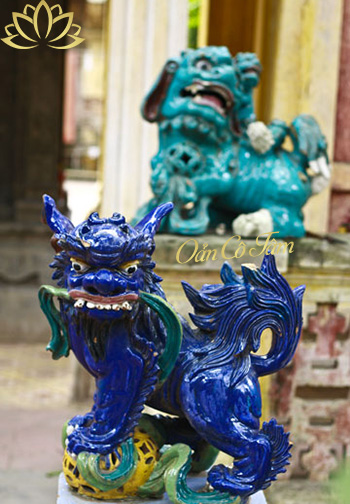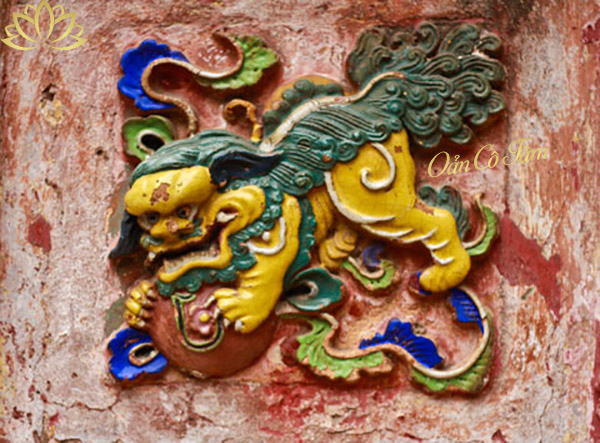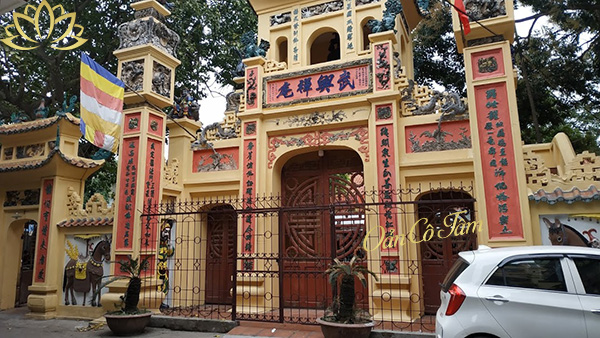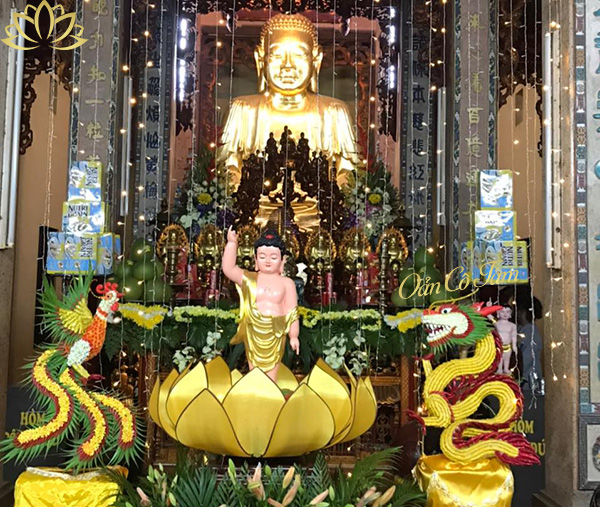About Hung Ky Pagoda
Hung Ky Pagoda is an ancient temple located at Hung Ky alley, Minh Khai street, Hai Ba Trung district, Hanoi city. Previously, this area was the territory of Hoang Mai village in Doai village. The pagoda is also known as Vu Hung Tu, the name is Vo Hung Truyen Am.
Hung Ky Pagoda is considered a unique architectural and artistic work that appeared at the end of the Nguyen Dynasty. The outstanding feature of the pagoda that cannot be found anywhere else is the skillful use of decoration with modern building materials such as ceramics and porcelain combined with traditional architectural styles. Since then, creating a pagoda with unique architecture in the history of Vietnamese Buddhist architecture.
In 1992, this temple was ranked as preserved by the Ministry of Culture and Information and currently, the temple is abbot by Nun Thich Tu An.
History of formation and development
Legend has it that, in the eighth year of Bao Dai, in 1932, a Buddhist named Tran Van Thanh (also known as Hung Ky) started the construction of the pagoda on an area of 3,000 square meters. As an ethnic bourgeoisie specializing in brick production, he built pagodas with unique ceramic materials that were different from other temples.
See more:
Accordingly, most of the architectural items of the pagoda from the three-way gate, the Three Jewels building, the Buddha hall or the ancestral house are decorated with ceramic scrolls. At the same time, the architectural surface is also carved with sophisticated patterns that will last forever. People also named the pagoda Hung Ky pagoda after the person who built the pagoda.
After more than 80 years of existence, Hung Ky Pagoda still retains its unique ceramic architecture that cannot be found anywhere else. This Buddhist work is likened to a precious flower that has weathered storms and is still full of flavor in the heart of the city.
Learn about the one-of-a-kind porcelain architecture
The most special Hung Ky pagoda is probably because of the temple’s architecture. The three-way gate is designed according to the architecture of two floors with eight roofs, with the upper floor being the steeple. The central gate consists of four pillars carved with phoenix birds, lanterns and covered with four spirits. Meanwhile, the two outer sides of the auxiliary gate are embossed with reliefs of elephants and horses. The raised corner of the roof is carved with a delicate dragon adoring the moon.
In particular, at the pillars at the temple gate, there are very unique glazed porcelain couplets in Chinese and Nom characters.
Standing and looking at the good land, the birds are the most happy in Long Do, is it Ke Mo in the lost land?
Encountering the day when the river avalanches and sand flies in the world, there is no place like the Buddha’s door in a famous place.
Going through the gate of the temple is to a large yard leading to the Three Jewels. Tam Bao Hung Ky pagoda has the shape of Dinh with three compartments: Tien Duong, Thieu Huong and Thuong Dien. The roof is covered with pipe tiles, the head is attached with the word “Tho”, on the roof is displayed in the middle of a cup containing nectar. In the ancient part, decorated with themes in the story Journey to the West, it describes the 81 tribulations of the teachers and students of Tang Tang on the way to Tay Truc to get the scriptures.

Stepping to the steps, we will see more clearly the entire truss column, hitch, beams are made of reinforced concrete, the outside is coated with light pink granito. In the two gables, two buildings of the Ten Palaces of Hell are depicted, depicting realistically and vividly the scenes of the world and the dungeons. On each side of the cave, there are 5 Kings of Hell, 2 Heavenly Kings and many other statues. This work is molded by a skilled craftsman from Bat Trang village with clay, painted, glazed and fired.



Inside the Three Jewels are decorated statues of Buddha and Mother Lieu Hanh. In the center of the Buddha hall is a statue of Amitabha Buddha in a meditating posture in the lotus position. This statue is 3.86m high with a pedestal 1.3m high, which is considered the largest and most massive statue.
In front of the statue of Amitabha is a statue of Maitreya – the future Buddha who replaces Shakyamuni to rule all beings. Maitreya statue is carved in a sitting position, with a big belly, a full face, and a big smile.
In front of the Buddha hall, there are statues of Quan Am and Dai The Chi Bodhisattva (Amitabha three respects). The statue of Quan Am wearing a shaman’s hat, wrapped in a robe, stood in a raised position while Dai The Chi statue held a pitcher of nectar in his hand. These two wooden statues are 3.3m high, standing on a lotus flower placed on a 0.56m high brick pedestal.

The stele house is located behind the Buddha hall with a square architecture with four pillars and two roofs. In the middle of the house is a stele made of monolithic stone, 1.1m square, 2.7m high.
The epitaph of Hung Ky pagoda, composed by layman La Nam Mai in 1933, writes that:
On the side of Long Thanh built a temple
Come on, the Buddha is colorfully adorned
What’s so bad about Shintoism?
Ha Thanh’s side paints talent
Famous places by Tonkin
Truly the best long-term sailor.

The complex of Hung Ky pagoda relics also includes Tam Thanh communal house and Mai Sau palace located on the temple grounds. Mai Sau Palace has money for sacrifices, incense burning, forbidden palaces, and five doors. It is decorated with paintings covered with colored porcelain such as Bat Tien Nam Hai, the story of Lieu Hanh turning to Buddha, statues of Que Nuong, Mrs. Nhi Nuong, and St. Thien… Electric yard has water tank and rockery.
Hung Ky Pagoda today still preserves almost intact a large number of multi-colored glazed ceramics that have been mounted and mounted on the components of the architecture of the sacred Buddhist place. This pagoda is a testament to the talents of Vietnamese artisans in the early 20th century. In addition, at the temple, there is a preserved skeleton of a Ho Guom turtle with a large wound on its shell.


Experience visiting and sightseeing Hung Ky pagoda
Notes when coming to Hung Ky pagoda
Although it is a temple with a history that is not as old as other temples, Hung Ky Minh Khai pagoda has a special attraction for tourists and Buddhists near and far because of its rich and diverse architectural art. Therefore, not only on Tet holidays, full moons, Buddhist festivals but also on weekdays, the temple also welcomes many visitors to admire the ancient architecture, sightsee and worship the Buddhas of the same heart. towards good health and peace.
Going to Hung Ky pagoda to worship, everyone should dress politely, not revealingly, Should wear low-soled shoes or sandals to facilitate movement. In addition, you should also prepare change and make sincere offerings to worship at the temple door. Like other temples, the disciples who come to the temple do not need to prepare a full plate of offerings, but simply but sincerely are enough. We should only offer incense to the Buddha with vegetarian and pure food such as flowers, fresh ripe fruit, betel nut, sticky rice, or products. If we celebrate the Mother’s Temple, we can buy vegetarian and salty offerings as we please, but salty foods should be simple foods such as chicken and sausages.
Among the offerings made to the temple, Oan Tai Loc is the real jade chosen by many people to add solemnity, sacredness and integrity. Ms. Tam’s Oan Tai Loc is a unique and meaningful design offering that can be displayed for a long time without being damaged or moldy.
With an understanding of sacred spiritual beliefs, the artisans at Oan Co Tam have researched and improved the design to create Oan Tai Loc Buddhist works of many sizes to choose from at extremely affordable prices. .
Location and how to get to the temple
Hung Ky Pagoda is located near the end of Hung Ky Lane, Minh Khai Street, Hai Ba Trung District, Hanoi. This location is about 5km from the city center. If going from Sword Lake, visitors go to Mo market, turn left to Minh Khai street to house number 228 to reach Hung Ky alley. Go to the alley about 300m more to reach the temple.
Because it is located in an alley, visitors who use personal vehicles to move, please park the car outside and then walk into the temple. Or you can use the bus to get to the temple is also very convenient. Going to Hung Ky Pagoda , visitors can refer to the route of bus routes passing through such as bus 03B, 19, 24, 38, 52A, 52B.
Source: Collected internet.







